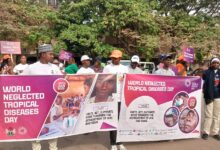FG Moves To Improve Patient, Family Engagement In Medical Procedures

Spurred by the desire to reduce the country’s high rate of medical errors, the Federal Government has developed a National Policy and Implementation Strategy on Patient Safety and Care Quality to prevent errors and minimise harm to patients during the provision of healthcare services.
The Permanent Secretary of the Federal Ministry of Health and Social Welfare, Kachollom Daju, disclosed the development on Monday, September 18, 2023, at a press briefing to commemorate the 2023 World Patient Safety Day in Abuja.
Daju said this was been done in line with Resolution 18 of the 55th World Health Assembly (WHA 55.18), which called for Member States to recognize the burden of patient safety and to set up policies to manage them.
She explained that the policy focused on improving patient and family engagement in health care, medication safety, surgical safety, infection prevention & control (IPC), and ultimately the safety of all medical procedures.
According to her, “Patient safety fundamentally entails preventing errors and minimizing harm to patients during the provision of healthcare services.
“These errors could come from surgical mishaps, medication errors, or diagnostic inaccuracies; however, safeguarding our patients is of utmost importance.”
Furthermore, Daju said the World Patient Safety Day commemoration underscored the importance of patient safety in Nigeria’s healthcare system. Adding that, engaging patients for patient safety emphasised the pivotal role patients, their families, and caregivers play in ensuring the safety of healthcare delivery.
“Empowering patients to become integral members of their healthcare teams is a crucial avenue to significantly enhance the safety of their care and the healthcare system as a whole.
“Patients can provide invaluable contributions when they actively participate in their healthcare decisions. Research has shown that there is a positive correlation between patient active participation in their care and overall health outcomes.
“Under the banner ‘Elevate the voice of patients!’, the World Health Organization calls upon all stakeholders to take the necessary steps to ensure that patients are not just passive recipients of healthcare but active participants.
“This includes involving them in policy formulation, representation in governance structures, co-designing safety strategies, and making them partners in their care.
“Our commitment to providing safer and higher-quality health services to all the able and vulnerable, to the child and the adult, to the males and female, everyone in Nigeria is resolute. This effort will strengthen our healthcare system and build the trust that citizens place in it”, she said.
Meanwhile, the World Health Organisation (WHO) Country Representative, Dr. Walter Kazadi Mulombo, in his goodwill message, said the quality of care provided was often jeopardized as a result of lack of coordination and fragmentation of quality programmes, human resource challenges, and inadequate data to guide decisions.
Mulombo, who was represented by the Deputy County Representative, Alexander Chimbaru explained that the Global Patient Safety Action Plan 2021-2030 outlined important guidelines, including identifying local and tailored approaches to engage patients, families, and civil society organizations in the co-development of policies, plans, strategies, programmes, and guidelines to make health care safer.
“Learn from the experiences of patients and families exposed to unsafe care to improve understanding of the nature of harm and foster the development of more effective solutions.
“Build the capacity of patient advocates and champions in patient safety. Establish the principle and practice of openness and transparency in health care, including measures for disclosure of patient safety incidents to patients and families.
“Provide information and education to patients and families for their involvement in self-care and empower them for shared decision-making”.
The WHO Nigeria Country Reprei reiterated that it was crucial to recognise that many stakeholders engaged in health and healthcare in the country, and indeed in the AFRO region needed to become more familiar with the concepts associated with patient and family engagement, which were key in ensuring patient safety:
“They also need more capacity to incorporate patient and family engagement into new or existing patient safety and overall service delivery efforts.
“Collective efforts to provide educational tools for patients and deliver programmes and services tailored to their needs and preferences can enhance patient experiences and offer beneficial impacts and better clinical and overall health outcomes”, he said.






